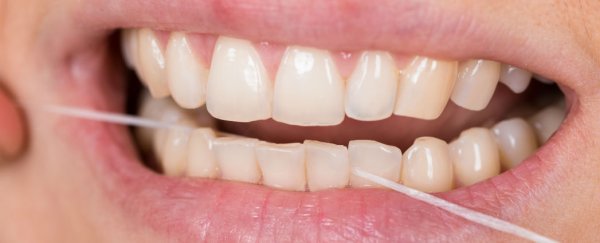In a case that shows just how intrinsically connected every part of our body is, a woman in the US has been diagnosed with a severe bacterial infection in her knee, and doctors say her new vigorous flossing regimen was likely the cause.
The woman, who had received knee-replacement surgery five years prior to the infection, recently checked herself into a hospital in Wisconsin with an incredibly painful, swollen knee. When fluids were drained from the knee and analysed, her doctors said the replacement joint had been infected with the bacterium Streptococcus gordonii. What's weird about this is that S. gordonii is typically found in the mouth, where it rapidly colonises clean tooth surfaces and lingers as a generally harmless colony.
So how did this 'mouth bacterium' end up in the woman's knee joint, and why did a simple change in location transform it from a harmless freeloader into a dangerous pathogen?
According to Laura Geggel at Live Science, it was only when the woman reported that she "had voluntarily [started] a vigorous dental flossing regimen, with bleeding from her gums as a result," that the doctors could figure out what was going on.
"It's likely that the bacteria spread from the mouth, though her bloodstream and onto the knee implant," says Geggel. So the good news is that the doctors were able to nail down the cause of the infection, but the bad news is that to avoid further risk of infection, the woman is going to have to take preventative antibiotics for the rest of her life. Or at least for as long as she has the prosthetic knee implant.
According to the report, outlined in BMJ Case Reports this month, this is the first time the oral S. gordonii bacterium has been linked to a prosthetic infection in the US. And that should bring comfort, not anxiety, to those who also floss and have a medical implant, co-author of the report and infectious disease expert, Ala Dababneh from the Mayo Clinic in Minnesota, told Live Science. "It's a rare event," he said. "I don't want people to worry that just flossing is going to cause them an infection in their prosthetic joint."
As foreign materials inserted into the human body, medical prosthetics are especially prone to infections, especially within the first few months of implantation. Because the immune system doesn't really know how to deal with them, bacteria can sometimes be left to form biofilms on their surfaces, which are notoriously resistant to our own natural immune defences, and antibiotic treatment. And the longer that biofilm is left to fester and grow, the harder it is to remove.
"Still, it's rare to find an S. gordonii infection on a prosthetic; just about 2 percent of late-onset prosthetic joint infections involve the bacterial group streptococci," says Geggel at Live Science. "Most infections on prosthetic devices (57 percent) are related to the bacteria Staphylococcus aureus and Staphylococcus epidermidis, which are frequently found on the skin or respiratory tract, according to the report."
Because it's such an unlikely outcome, doctors stress that anyone with medical implants should still continue to floss, even if you're breaking the skin of the gums occasionally. In the future, certain at-risk patients might be prescribed regular antibiotic treatments after having an implant operation, but until then, it's not worth risking your oral health over. Because, rather ironically, if you forego flossing to lower your risk of an S. gordonii infection on your implant, you risk getting one in your mouth.
H/T: Live Science
